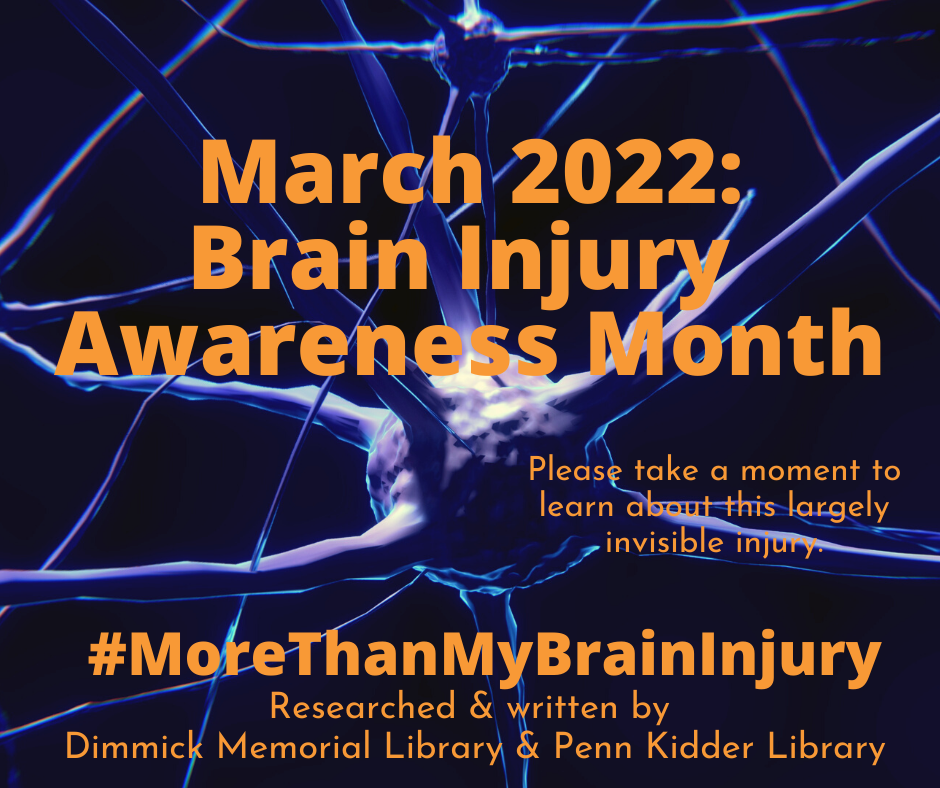March is Brain Injury Awareness Month, and Dimmick Memorial Library, along with its Penn-Kidder Branch, are excited to offer the community an array of educational resources to help foster a better understanding of how brain injuries affect the community. This year, The Brain Injury Association of America (BIAA) has continued its nationwide #MoreThanMyBrainInjury campaign, spotlighting survivors to “increase understanding, reduce stigma, improve care, and showcase the diversity in [the brain injury] community.” In support of this mission, Dimmick and Penn-Kidder will host an educational discussion in the coming weeks, while continuing to offer access to a very wide range of reading material on the subject at our libraries and those in the region. Education is, after all, the only road to understanding.
Traumatic Brain Injuries (TBIs) are alarmingly common, as highlighted by the findings of Pennsylvania’s own TBI Advisory Board. The Board’s analyses in 2020 revealed that roughly 138,600 people sustain brain injuries annually. And at the time of the study there were 209,880 adults and children living with disabilities as a result of their injury.
But just what is a TBI? How do we prevent them? And, more to the point of the campaign, what can we do to help those who have suffered one? TBIs are most often suffered by blunt force trauma to the head, causing “a disruption in the normal function of the brain.” Falls, car accidents, violent assaults, athletic activities, and workplace injuries are cited amongst the most common incidents resulting in TBI.
Although many people may fully recover from such an injury, others may develop symptoms or disabilities that will impact the rest of their lives. Because TBIs target the most complex organ of the human body, the effects are completely unpredictable. Even a seemingly mild TBI may result in permanent chemical changes in the brain or severe cell damage.
In some cases brain injury may even alter one’s behavior, such that the person no longer acts quite like themselves. Naturally this will strain relationships, as it’s difficult for people who’ve not suffered a TBI to understand what the other is going through. Patience and education will help. And it’s worth it, because support is absolutely vital for a good recovery.
Common courtesy is a as good a place to begin as any. When speaking to a person with a TBI, be mindful that their challenges will probably not be visible to the naked eye, nor can they be so easily overcome as, say, a broken leg. Be sensitive to their condition. It’s often tempting to think that a casual or lighthearted comment is helpful, but this seldom the case. Among some phrases commonly endured by those with TBIs include “You sure don’t look disabled,” and “I know someone with a brain injury and they’re fine,” or “Hey, I forget things all the time too!” Regardless how well-intentioned they might be, comments like these are plainly dismissive and unsupportive.
If someone you know has suffered a TBI, the most important thing you can do is to educate yourself on the subject. There are many resources online, available at the BIAA’s website, and cdc.gov. And even more valuably there are plenty of books on the topic as well.
Effectively educating yourself may take a while, but there’s plenty you can do to show your support in the meantime. Be attentive and sympathetic. Offer to help whenever possible. Remember that a person may not always be comfortable asking for help, but may still need it, and never assume that “no news is good news.” (Let’s face it; that’s almost never true.)
It’s important to remember that no two brain injuries are entirely alike. But even if TBIs were all the same, they would still affect people differently, because people aren’t entirely alike.
And although education is important, support begins with one very simple understanding:
People are not defined by a diagnosis. A person is always a person first.



























Add Comment